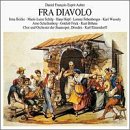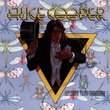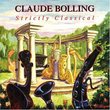| All Artists: Daniel-Francois-Esprit Auber, Bruno Seidler-Winkler, Karl Elmendorff, Leo Blech, Ugo Tansini, Wilhelm Buschkötter, Orchester der Bayerischen Staatsoper, Arno Schellenberg, Eduard Habich, Erna Berger, Gottlob Frick, Hans Hopf, Helge Rosvaenge, Hermann Jadlowker, Irma Beilke, Kurt Böhme, Lina Pagliughi, Lorenz Fehenberger, Marcel Wittrisch, Maria Luise Schilp Title: Auber: Fra Diavolo Members Wishing: 0 Total Copies: 0 Label: Preiser Records Release Date: 6/1/1999 Genre: Classical Styles: Opera & Classical Vocal, Historical Periods, Modern, 20th, & 21st Century Number of Discs: 2 SwapaCD Credits: 2 UPC: 717281903493 |
Search - Daniel-Francois-Esprit Auber, Bruno Seidler-Winkler, Karl Elmendorff :: Auber: Fra Diavolo
 | Daniel-Francois-Esprit Auber, Bruno Seidler-Winkler, Karl Elmendorff Auber: Fra Diavolo Genre: Classical
|
Larger Image |
CD DetailsSimilar CDs |
CD ReviewsFRA DIAVOLO: opéra-comique with entertaining melodies. J. E. ASENCIO-NEGRON | Guaynabo, Puerto Rico USA | 04/08/2000 (4 out of 5 stars) "Daniel-François-Esprit Auber was a prolific & leading composer of French opera in his time, even though his operas are scarcely ever performed today (with the exception of this work: Fra Diavolo, ou L'hôtellerie de Terracine (28 Jan 1830 Opéra Comique, Paris), which has remained in the repertoire of some opera houses mainly due to its pleasant tunes and stirring martial airs). He scored his first public success with a 3-act opéra-comique in 1820: La Bergère châtelaine (Jan 27, 1820 Opéra Comique, Paris), in collaboration with the librettist Augustin-Eugène Scribe. His last opera: Rêve d'amour (20 Dec 1869 Opéra Comique, Paris), written when he was 87, was one of the most sucessful of the 47 operas he wrote. He is particularly known for his contributions to the genre of the "opéra-comique" (from which Fra Daviolo (1830) is a masterpiece of the form), although one of his most famous works was: Masaniello, ou La muette de Portici (29 Feb 1828 Théâtre de l'Opéra, Paris). This work, staged in Paris in 1828, began the era of French Grand-Opéra. Beasides, it is said that when La muette de Portici was presented in Belgium, the Act II tenor-baritone duet supposedly set off a patriotic fervour that precipitated the Belgian struggle for independence from Holland in 1830. The Fra Diavolo's overture is delightful and rich in melodies from the body of the opera, and it is my favorite from the ones Auber wrote (the other three are: Le cheval de bronze (The Bronze Horse), Masaniello oú La muette de Portici, and Les diamants de la couronne (The Crown Diamonds). You will never find anything revolutionary in Auber's scores, only beautiful melodies/themes with little development. However, it is the freshness of his light dramatic music which appeals you the most. Other example of Auber's success was: Le domino noir (2 Dec 1837 Opéra Comique, Paris)."
|

 Track Listings (11) - Disc #1
Track Listings (11) - Disc #1

